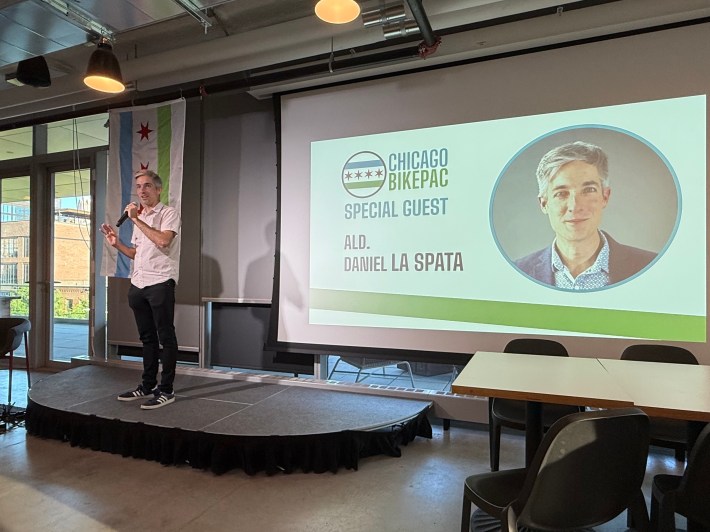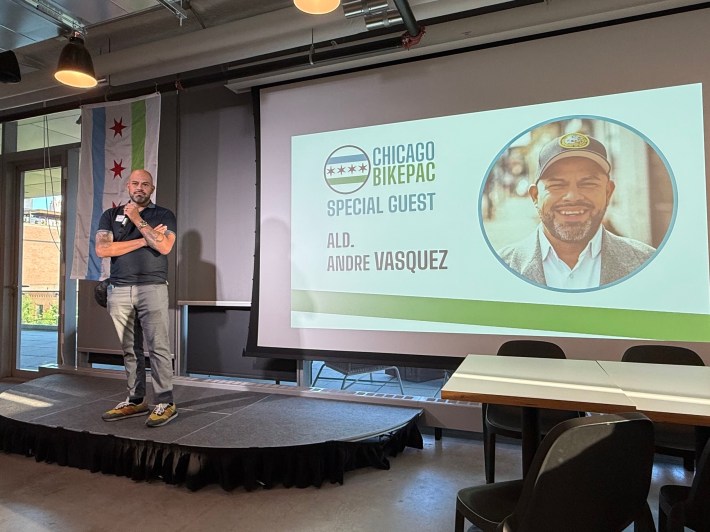Chicago BikePAC officially launched yesterday, August 21st, during a special event at the West Loop headquarters of SRAM, a global bike parts maker based in Chicago. The Chicago BikePAC was started by cycling advocates Kevin Borgia and Chris Ridgeway, who are planning on changing the next election for Chicago City Council members. By the end of the night they raised over $16,000, and SRAM matched donations, up to $5,000.
In their presentation, Borgia and Ridgeway said that Chicago BikePAC would support candidates, regardless of political party, who share their vision of cycling in Chicago. That vision: bicycles should be a viable transportation choice in Chicago and children should be safe riding to school.
A PAC, short for political action committee, is a legal entity that contributes directly to candidates or spends money independently to promote their candidacy.
Ald. Daniel La Spata (1st Ward) was a special guest during the launch party. La Spata is the Chair of the Chicago City Council's Committee on Pedestrian and Traffic Safety and attended the event with his young daughter Lulu, which he said was the newest cyclist in the 1st Ward. After her balance bike spent nine months in the basement with only her baby doll allowed to ride it, her bike is now the only way that she gets to daycare in the morning.

"[Riding with her is] an absolute blast, and it changes how I think about something that I love," said La Spata. "Like we talk about sidewalks and we talk about PROWAG accessibility standards in theory. And then when you are riding a bike alongside someone for whom an inch is a bump, as she calls it, you think differently about accessibility." PROWAG is the Public Rights-of-Way Access Guidelines which outline federal standards of accessibility to implement the requirements of the Americans with Disabilities Act (ADA) and the Architectural Barriers Act (ABA).
La Spata then described and mimed how his daughter's lower height aligns with the top of a car hood, adding, "It makes it inexcusable for us not to act, and I'm glad to have so many partners in acting on this because you prove out the PAC has your back at the end of the day."
La Spata also talked about how he used to be apologetic about bike issues and how, after they put protected bike lanes down Milwaukee Avenue for the first time, there were people who told him, "This is why you're going to be a one-term alderman." He believes that the areas where they did the most bike infrastructure are the precincts that he did the best in, "which tells you something", he surmised.
La Spata also mentioned how when working on issues around gender based or gun violence, it comes from a place of anger and dissatisfaction, but working on cycling issues comes from a place of joy.
Ald. Andre Vasquez (40th Ward) was the other special guest. He also relayed a personal story regarding biking. Vasquez talked about how he and his friends grew up in poor neighborhoods where they didn't learn how to ride a bike, so he didn't know how to bike until he was 42 years old. Vasquez also gave a shoutout to his friend, a former consul general of the Netherlands in Chicago.

"We had done a ride in my second year, and so we're riding around, and I asked the guy, I'm like, 'Hey, like, what does Chicago's infrastructure look like in comparison?'" said Vasquez. "And [the consul general] was like, 'infrastructure is actually pretty solid. There are some changes you can make here and there, but the bones are good.'"
Vasquez continued, saying, "The difference is the education and the awareness and the intentionality. The people ride their bikes their whole life. They learn the rules of the road. There's a different experience and understanding, and that is what is sorely, sorely lacking in the city, state, and country.
"We're doing all these bike lanes, we're doing all the green paint, we're putting all the signage up, and a driver has zero idea what any of this stuff means. And so when you're a cyclist doing everything possible when following all the rules of the road, but when a driver has no idea what's going on, there's conflict created that is unnecessary. And so when I think about the work that we want to continue doing, it is making sure that we're intentional about the awareness of what the rules of the road look like."
Borgia and Ridgeway also said that Chicago BikePAC, which operates with an advisory board, intends to "endorse issues and candidates based on positions on cycling infrastructure, comprehensive traffic and safety policy, equitable enforcement, access and availability, and leadership in promoting a shift in culture to cycling for all ages and demographics."
At the end of the meeting, Chicago BikePAC had a donation drive with the goal of reaching $10,000. Before departing for the evening at 7 pm, this author saw that Chicago BikePAC had received donations totaling $16,529. Regardless of your opinion of what Chicago BikePAC is trying to achieve, most people would probably call that a great start to a new organization.

Do you appreciate Streetsblog Chicago's paywall-free sustainable transportation reporting and advocacy? We officially ended our 2024-25 fund drive last month, but we still need another $44K to keep the (bike) lights on in 2026. We'd appreciate any leads on potential major donors or grants. And if you haven't already, please consider making a tax-deductible donation to help us continue publishing next year. Thanks!




